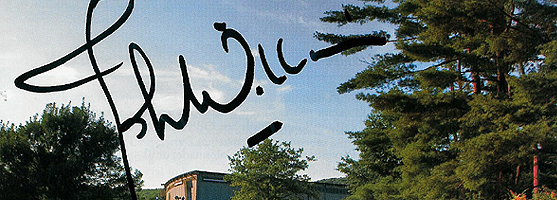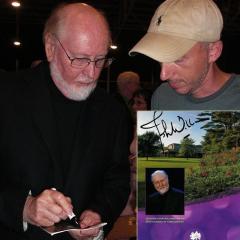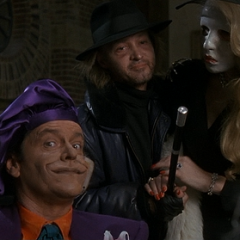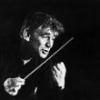-
Posts
4,638 -
Joined
-
Last visited
-
Days Won
6
Reputation Activity
-
 Sandor got a reaction from TownerFan in At what point did Spielberg movies start being overproduced and how do we feel about this?
Sandor got a reaction from TownerFan in At what point did Spielberg movies start being overproduced and how do we feel about this?
Most artists experience a creative peak during their careers. Spielberg had his. I've accepted this long ago and my appreciation of Spielberg is based on his entire oevre, not just his most recent work.
I love Spielberg. Always have, always will. I also love his loyal collaborations. This is what makes him special. Spielberg will easily be remembered as one of the greatest filmmakers of all time.
And I enjoy every film the man makes. I'm just not expecting another E.T. or Raiders Of The Lost Ark. I am however eagerly awaiting his next projects.
-
 Sandor got a reaction from KK in Lincoln SCORE Discussion thread
Sandor got a reaction from KK in Lincoln SCORE Discussion thread
I think?
So exactly how sure are you whether Williams' scores are 'predictable' or not? Just because Seven Years In Tibet and Memoirs Of A Geisha have an Asian flavour, doesn't mean they're copies or anything remotely like that. But I guess this is how you reason: Seven Years In Tibet and Memoirs Of A Geisha = Asian-style scores = (must be) identical scores. I doubt you're even familiair with the music. Angela's Ashes, Schindler's List and War Horse = dramatic scores = identical scores (they both feature strings and stuff like that).
You couldn't be more wrong man.
Exactly what would it take for you to appreciate a score like War Horse from a innovative perspective? When Williams had scored if for 17 drumkits? When Williams had used Joe Satriani to play the electric guitar solos? When he had asked Lady Gaga to sing the theme song? War Horse was Williams reinventing himself quite a bit. Not in Earth shattering ways, but Williams returned to a more simple, pure melodic approach with non-complex, basic chords and harmonies. This is vastly different from, let's say, Angela's Ashes or Schindler's List. The 'Remembering Emilie' theme alone is written in an idiom seldomly chosen by Williams. It's the simple and direct melodic structure that gives War Horse a sense of fresh air and sets it apart from many other of Williams' dramatic scores.
But I guess it could only find your approval if Williams had done something radical like adding hip-hop beats. Only then would someone like you call it 'unexpected'.
The same goes for Tintin. It is fresh and the first time I heard it I thought to myself: "This is Williams doing something I've never heard before". The unpredictable nature rests more in the nuance of the action material and the slight stylistic changes from his previous scores.
I feel Williams' music is always changing. Not revolutionary, but evolutionary. That's why Williams probably couldn't write Star Wars today and he couldn't write Memoirs Of A Geisha back in 1977.
He's truly a remarkable composer who doesn't deserve this 'Williams is too predictable'-crap. The man is as diverse a composer as they come.
-
 Sandor got a reaction from Gruesome Son of a Bitch in Lincoln SCORE Discussion thread
Sandor got a reaction from Gruesome Son of a Bitch in Lincoln SCORE Discussion thread
I think?
So exactly how sure are you whether Williams' scores are 'predictable' or not? Just because Seven Years In Tibet and Memoirs Of A Geisha have an Asian flavour, doesn't mean they're copies or anything remotely like that. But I guess this is how you reason: Seven Years In Tibet and Memoirs Of A Geisha = Asian-style scores = (must be) identical scores. I doubt you're even familiair with the music. Angela's Ashes, Schindler's List and War Horse = dramatic scores = identical scores (they both feature strings and stuff like that).
You couldn't be more wrong man.
Exactly what would it take for you to appreciate a score like War Horse from a innovative perspective? When Williams had scored if for 17 drumkits? When Williams had used Joe Satriani to play the electric guitar solos? When he had asked Lady Gaga to sing the theme song? War Horse was Williams reinventing himself quite a bit. Not in Earth shattering ways, but Williams returned to a more simple, pure melodic approach with non-complex, basic chords and harmonies. This is vastly different from, let's say, Angela's Ashes or Schindler's List. The 'Remembering Emilie' theme alone is written in an idiom seldomly chosen by Williams. It's the simple and direct melodic structure that gives War Horse a sense of fresh air and sets it apart from many other of Williams' dramatic scores.
But I guess it could only find your approval if Williams had done something radical like adding hip-hop beats. Only then would someone like you call it 'unexpected'.
The same goes for Tintin. It is fresh and the first time I heard it I thought to myself: "This is Williams doing something I've never heard before". The unpredictable nature rests more in the nuance of the action material and the slight stylistic changes from his previous scores.
I feel Williams' music is always changing. Not revolutionary, but evolutionary. That's why Williams probably couldn't write Star Wars today and he couldn't write Memoirs Of A Geisha back in 1977.
He's truly a remarkable composer who doesn't deserve this 'Williams is too predictable'-crap. The man is as diverse a composer as they come.
-
 Sandor got a reaction from Muad'Dib in Lincoln SCORE Discussion thread
Sandor got a reaction from Muad'Dib in Lincoln SCORE Discussion thread
I think?
So exactly how sure are you whether Williams' scores are 'predictable' or not? Just because Seven Years In Tibet and Memoirs Of A Geisha have an Asian flavour, doesn't mean they're copies or anything remotely like that. But I guess this is how you reason: Seven Years In Tibet and Memoirs Of A Geisha = Asian-style scores = (must be) identical scores. I doubt you're even familiair with the music. Angela's Ashes, Schindler's List and War Horse = dramatic scores = identical scores (they both feature strings and stuff like that).
You couldn't be more wrong man.
Exactly what would it take for you to appreciate a score like War Horse from a innovative perspective? When Williams had scored if for 17 drumkits? When Williams had used Joe Satriani to play the electric guitar solos? When he had asked Lady Gaga to sing the theme song? War Horse was Williams reinventing himself quite a bit. Not in Earth shattering ways, but Williams returned to a more simple, pure melodic approach with non-complex, basic chords and harmonies. This is vastly different from, let's say, Angela's Ashes or Schindler's List. The 'Remembering Emilie' theme alone is written in an idiom seldomly chosen by Williams. It's the simple and direct melodic structure that gives War Horse a sense of fresh air and sets it apart from many other of Williams' dramatic scores.
But I guess it could only find your approval if Williams had done something radical like adding hip-hop beats. Only then would someone like you call it 'unexpected'.
The same goes for Tintin. It is fresh and the first time I heard it I thought to myself: "This is Williams doing something I've never heard before". The unpredictable nature rests more in the nuance of the action material and the slight stylistic changes from his previous scores.
I feel Williams' music is always changing. Not revolutionary, but evolutionary. That's why Williams probably couldn't write Star Wars today and he couldn't write Memoirs Of A Geisha back in 1977.
He's truly a remarkable composer who doesn't deserve this 'Williams is too predictable'-crap. The man is as diverse a composer as they come.
-
 Sandor got a reaction from mahler3 in Favorite Elton John Song?
Sandor got a reaction from mahler3 in Favorite Elton John Song?
The thing with Elton is, even his lesser known songs feel like classics.





